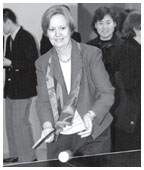“Ping-pong diplomacy” at Beijing’s Rendafuzhong High School. |
Travels in Asia
I suspect there is no place on earth where one cannot find a group of loyal and enthusiastic Princetonians. This fall I spent 11 days traveling in Asia with a group that included Dean of the Graduate School William Russel, Dean of Admission Janet Rapelye, Professor of Sociology and Director of the Princeton Institute for International and Regional Studies (PIIRS) Miguel Centeno, and Andrew Golden, the president of PRINCO. Our goal was to meet with alumni in Tokyo, Beijing, Hong Kong, and Seoul, to forge closer ties with distinguished universities in those cities, and to raise Princeton’s profile, especially in the minds of talented prospective undergraduates and graduate students. An enormous round of applause goes out to our many alumni on the ground, who hosted well-attended receptions and dinners, opened doors to high schools and universities, and arranged meetings with the media.
It would be impossible to capture within the limits of this page all of the highlights of this trip, so I have chosen a few illustrative examples of our activities. In Tokyo we were treated to a visit to the Hara Museum of Contemporary Art, founded by Toshio Hara ’60. The museum blends contemporary Asian art and works by European and American contemporary artists. Under Mr. Hara’s inspired leadership, the museum promotes international exchanges through exhibitions and the support of up-and-coming artists. Selections from the permanent collection were on display during our visit in celebration of the 25th anniversary of the museum’s founding. A particular highlight for me was an installation representing the studio of Japanese pop artist Yoshitomo Nara. Bruce Dunning ’62, the outgoing president of the Princeton Alumni Association of Japan, was our ever-attentive host.
China is a country moving in fast forward. I had visited Beijing in 1980, just after it had been opened to the West by Deng Xiao Ping, to attend a scientific meeting. Then China was a country suffering from the aftermath of the Cultural Revolution, with dust, bicycles, little red books, and Mao suits, along with a sense of foreboding, dominating the landscape. Today Beijing is a vibrant city, pulsating with energy and awash in shining new skyscrapers and construction cranes. As Andy Golden put it, “capitalism is in the DNA of the people,” and commerce is booming.
Nowhere was the bright future of China more evident than in our visit to the Rendafuzhong High School associated with Renmin University of China. This residential school of 4,000 students boasts modern dance studios, orchestra rehearsal halls, an Olympic swimming pool, and a first-class track, as well as classrooms full of PCs and Macs loaded with the most up-to-date software. Students are learning English at an early age and studying science and mathematics at a very high level. The students we met were very impressive, but in the past few have aspired to come to the United States to study. We hope this will change, although I did let Princeton’s reputation down by being soundly thrashed by the school’s principal, Liu Pengzhi, in ping-pong! Thanks to the efforts of a number of alumni and friends, I was interviewed on national television twice, on the Chinese equivalents of 60 Minutes and the Oprah Winfrey Show. I also visited the campus of Qinghua University, China’s leading university in science and engineering, where I met Professors Emeriti Andrew Yao of the Department of Computer Science and Wen Fong of the Department of Art and Archaeology. Both have returned to Beijing to participate in the revitalization of that great university.
In Hong Kong we attended an Alumni Council Regional Conference, at which Deans Rapelye and Russel discussed admission issues with a very engaged group of alumni and their guests. Professor Centeno described the new initiatives at PIIRS and his own empirical research on globalization. He is building a very large archive (www.princeton.edu/~ina/) that measures the ways in which nations interact with one another, from the number of phone calls they exchange to the number of items they trade. By compiling such information worldwide, it will be possible to describe the nature of the global networks that link up the planet. Lastly, Andy Golden chaired a panel on globalization and the Asian economy that included Trustee Louise Sams ’79, Andy Tung ’87, and Sir Gordon Wu ’58.
Our last stop was Seoul, where Y. S. Chi ’83 led us through a whirlwind day of press conferences and meetings with alumni and parents. One highlight of the day was meeting President Un-Chan Chung *78 of Seoul National University, who also presides over the Princeton Alumni Association of Korea. President Chung is a distinguished graduate of Princeton’s Department of Economics, and a highly respected national leader in Korea. Seoul National University is the leading university in Korea, and we were eager to explore with President Chung and his colleagues the opportunities for fruitful partnerships in the future.
I returned to Princeton the day after Election Day with a far deeper
understanding of Asia, and a reinforced commitment both to attract Asian
students to Princeton and to ensure that our non-Asian students have opportunities
to study and travel in this exciting part of the globe. ![]()



